Top Rankings
Franklin County Schools School District ranks among the top 20% of public school district in North Carolina for:
Category
Attribute
Diversity
Most diverse schools (Top 1%)
Community Size
Largest student body (number of students) (Top 1%)
For the 2025 school year, there are 8 public preschools serving 3,439 students in Franklin County Schools School District. This district's average pre testing ranking is 6/10, which is in the top 50% of public pre schools in North Carolina.
Public Preschools in Franklin County Schools School District have an average math proficiency score of 54% (versus the North Carolina public pre school average of 51%), and reading proficiency score of 43% (versus the 46% statewide average).
Minority enrollment is 65% of the student body (majority Black), which is more than the North Carolina public preschool average of 59% (majority Black and Hispanic).
Overview
This School District
This State (NC)
# Schools
16 Schools
994 Schools
# Students
7,978 Students
464,055 Students
# Teachers
525 Teachers
33,275 Teachers
Student : Teacher Ratio
15:1
15:1
District Rank
Franklin County Schools School District, which is ranked within the bottom 50% of all 320 school districts in North Carolina (based off of combined math and reading proficiency testing data) for the 2021-2022 school year.
The school district's graduation rate of 81% has decreased from 85% over five school years.
Overall District Rank
#205 out of 325 school districts
(Bottom 50%)
(Bottom 50%)
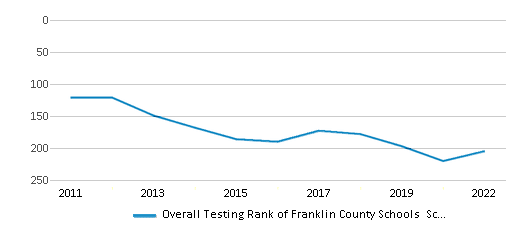
Math Test Scores (% Proficient)
46%
51%
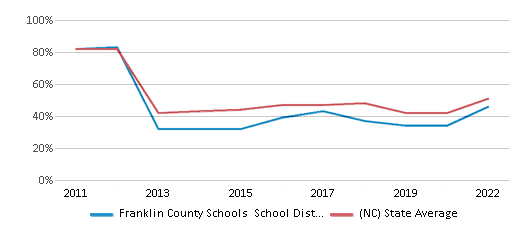
Reading/Language Arts Test Scores (% Proficient)
44%
50%
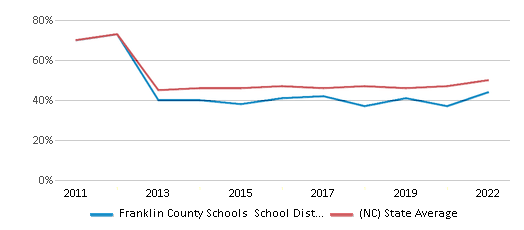
Science Test Scores (% Proficient)
59%
63%
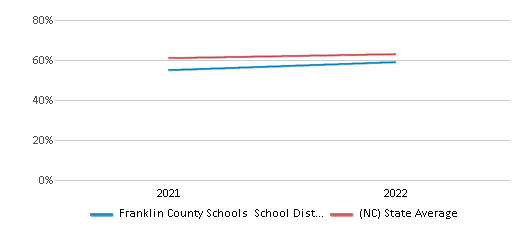
Graduation Rate
81%
86%
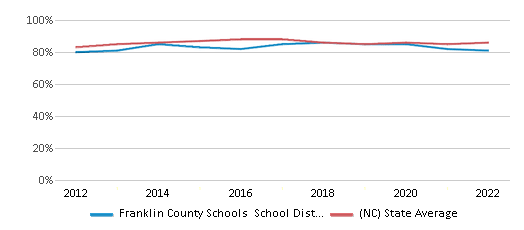
Students by Ethnicity:
Diversity Score
0.71
0.72
# American Indian Students
17 Students
6,572 Students
% American Indian Students
n/a
1%
# Asian Students
52 Students
18,458 Students
% Asian Students
1%
4%
# Hispanic Students
2,071 Students
105,943 Students
% Hispanic Students
26%
23%
# Black Students
2,468 Students
114,509 Students
% Black Students
31%
25%
# White Students
2,864 Students
189,147 Students
% White Students
36%
41%
# Hawaiian Students
3 Students
648 Students
% Hawaiian Students
n/a
n/a
# Two or more races Students
519 Students
28,778 Students
% of Two or more races Students
6%
6%
Students by Grade:
# Students in PK Grade:
124
23,104
# Students in K Grade:
509
72,144
# Students in 1st Grade:
548
74,289
# Students in 2nd Grade:
590
75,942
# Students in 3rd Grade:
541
68,925
# Students in 4th Grade:
547
69,686
# Students in 5th Grade:
580
66,668
# Students in 6th Grade:
563
5,021
# Students in 7th Grade:
597
3,684
# Students in 8th Grade:
545
3,629
# Students in 9th Grade:
855
214
# Students in 10th Grade:
714
194
# Students in 11th Grade:
691
187
# Students in 12th Grade:
574
368
# Ungraded Students:
-
-
District Revenue and Spending
The revenue/student of $11,621 is higher than the state median of $11,187. The school district revenue/student has stayed relatively flat over four school years.
The school district's spending/student of $10,978 is less than the state median of $11,612. The school district spending/student has stayed relatively flat over four school years.
Total Revenue
$93 MM
$17,307 MM
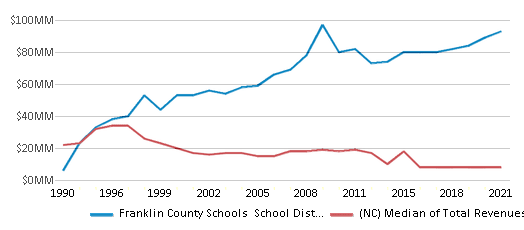
Spending
$88 MM
$17,964 MM
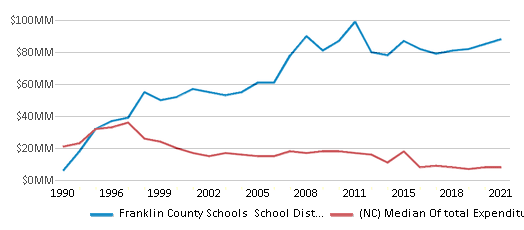
Revenue / Student
$11,621
$11,187
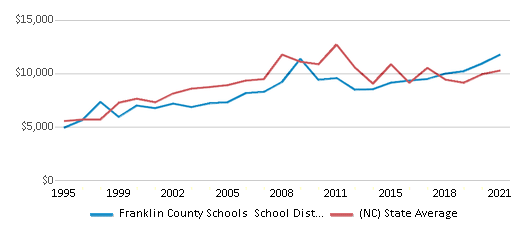
Spending / Student
$10,978
$11,612
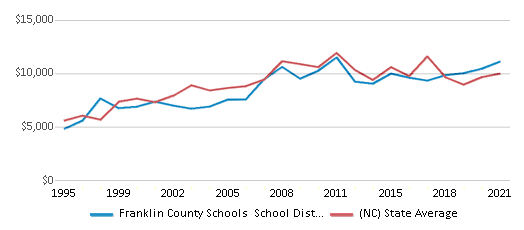
Best Franklin County Schools School District Public Preschools (2025)
School
(Math and Reading Proficiency)
(Math and Reading Proficiency)
Location
Grades
Students
Rank: #11.
Youngsville Elementary School
(Math: 63% | Reading: 59%)
Rank:
Rank:
8/
Top 30%10
125 Us I-a
Youngsville, NC 27596
(919) 556-5250
Youngsville, NC 27596
(919) 556-5250
Grades: PK-5
| 410 students
Rank: #22.
Edward Best Elementary School
(Math: 67% | Reading: 52%)
Rank:
Rank:
8/
Top 30%10
4011 Nc 56 Hwy East
Louisburg, NC 27549
(919) 853-2347
Louisburg, NC 27549
(919) 853-2347
Grades: PK-5
| 501 students
Rank: #33.
Long Mill Elementary School
(Math: 57% | Reading: 48%)
Rank:
Rank:
6/
Top 50%10
1753 Long Mill Rd
Youngsville, NC 27596
(919) 554-0667
Youngsville, NC 27596
(919) 554-0667
Grades: PK-5
| 412 students
Rank: #44.
Franklinton Elementary School
(Math: 52% | Reading: 40%)
Rank:
Rank:
5/
Bottom 50%10
431 S Hillsborough St.
Franklinton, NC 27525
(919) 494-2479
Franklinton, NC 27525
(919) 494-2479
Grades: PK-5
| 485 students
Rank: #55.
Laurel Mill Elementary School
(Math: 50-54% | Reading: 35-39%)
Rank:
Rank:
5/
Bottom 50%10
730 Laurel Mill Road
Louisburg, NC 27549
(919) 853-3577
Louisburg, NC 27549
(919) 853-3577
Grades: PK-5
| 285 students
Rank: #66.
Bunn Elementary School
(Math: 53% | Reading: 36%)
Rank:
Rank:
4/
Bottom 50%10
686 Bunn Elem School Road
Bunn, NC 27508
(919) 496-4015
Bunn, NC 27508
(919) 496-4015
Grades: PK-5
| 579 students
Rank: #77.
Louisburg Elementary School
(Math: 43% | Reading: 36%)
Rank:
Rank:
3/
Bottom 50%10
50 Stone Southerland Road
Louisburg, NC 27549
(919) 496-3676
Louisburg, NC 27549
(919) 496-3676
Grades: PK-5
| 413 students
Rank: #88.
Royal Elementary School
(Math: 40-44% | Reading: 30-34%)
Rank:
Rank:
3/
Bottom 50%10
308 Flat Rock Church Road
Louisburg, NC 27549
(919) 496-7377
Louisburg, NC 27549
(919) 496-7377
Grades: PK-5
| 354 students
Recent Articles

Year-Round Or Traditional Schedule?
Which is more appropriate for your child? A year-round attendance schedule or traditional schedule? We look at the pros and cons.

Why You Should Encourage Your Child to Join a Sports Team
Participating in team sports has a great many benefits for children, there is no doubt. In this article you will learn what those benefits are.

White Students are Now the Minority in U.S. Public Schools
Increasing birth rates among immigrant families from Asia and Central and South America, combined with lower birth rates among white families, means that for the first time in history, public school students in the United States are majority-minority. This shift in demographics poses difficulties for schools as they work to accommodate children of varying language abilities and socio-economic backgrounds.





